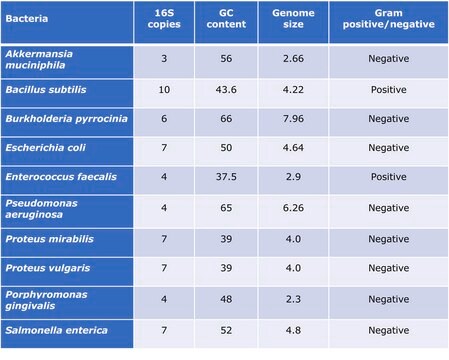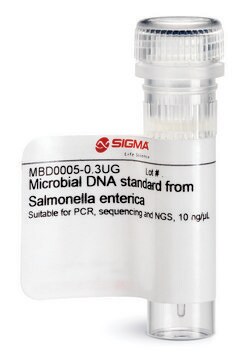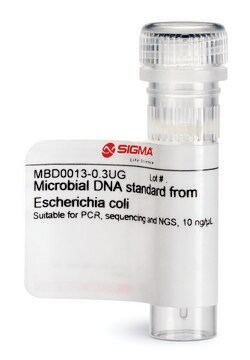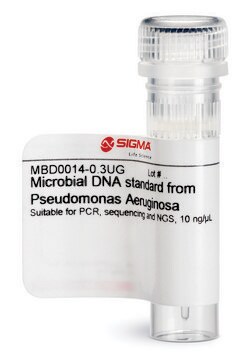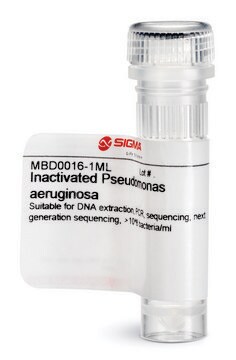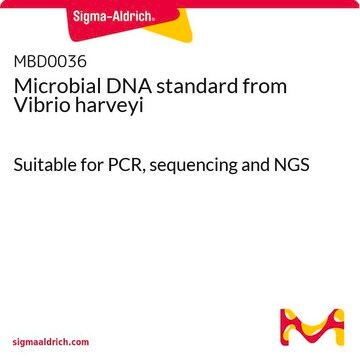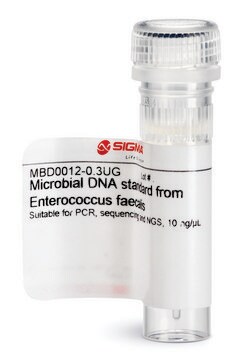MBD0019
Microbial DNA standard from Burkholderia pyrrocinia
Suitable for PCR, sequencing and NGS, 10 ng/μL
Sign Into View Organizational & Contract Pricing
All Photos(1)
About This Item
UNSPSC Code:
41105500
NACRES:
NA.24
Recommended Products
Quality Level
form
liquid
concentration
10 ng/μL
technique(s)
DNA extraction: suitable
DNA sequencing: suitable
PCR: suitable
shipped in
ambient
storage temp.
−20°C
Related Categories
General description
Standardization of sample analysis is currently needed in microbiome genomics research workflow. Lack of standardization can lead to biases and errors in common processes during sample preparation and analysis such as sample amplification, sequencing and bioinformatics analyses. Burkholderia pyrrocinia genomic DNA microbial standard can serve as standard for benchmarking the performance along the workflow of microbiomics or meta-genomics analyses and as a tool to increase reproducibility and allow comparison of results obtained by different labs.
Burkholderia cepacia complex (Bcc) species are a group of Gram-negative opportunistic pathogens that chronically infect the airways of cystic fibrosis patients, but they can also infect patients with various types of immunosuppressive disorders. Bcc members are multidrug resistant bacteria that have the ability to persist in the infected host and also elicit robust inflammatory responses. It currently includes 20 closely related, but distinct, species of bacteria, with a wide environmental distribution.
B. cepacia has an unusually large genetic make up with a total DNA content greater than 7 megabases and as many as three megabase-sized replicons. This large genetic make up accounts for its microbiological versatility. Advances in the taxonomy of Bcc revealed that it comprises at least nine genetically closely related species, including B. pyrrocinia, which can be differentiated on the basis of molecular and biochemical tests.
Read here how to use our standards to ensure data integrity for your microbiome research.
Burkholderia cepacia complex (Bcc) species are a group of Gram-negative opportunistic pathogens that chronically infect the airways of cystic fibrosis patients, but they can also infect patients with various types of immunosuppressive disorders. Bcc members are multidrug resistant bacteria that have the ability to persist in the infected host and also elicit robust inflammatory responses. It currently includes 20 closely related, but distinct, species of bacteria, with a wide environmental distribution.
B. cepacia has an unusually large genetic make up with a total DNA content greater than 7 megabases and as many as three megabase-sized replicons. This large genetic make up accounts for its microbiological versatility. Advances in the taxonomy of Bcc revealed that it comprises at least nine genetically closely related species, including B. pyrrocinia, which can be differentiated on the basis of molecular and biochemical tests.
Read here how to use our standards to ensure data integrity for your microbiome research.
Application
The genomic DNA is provided at >=10 ng/μL concentration in TE buffer pH 8.0. It is recommended to avoid freeze thaw cycles of this product.
Suitable for Quantitative standard for PCR, Sequencing and NGS
Suitable for Quantitative standard for PCR, Sequencing and NGS
Features and Benefits
- Individual microbial standard for microbiomics and meta-genomics workflow
- Suitable standard for PCR, sequencing and NGS
- Improve Bioinformatics analyses
- Increases reproducibility
- Compare results lab to lab
Physical form
Liquid - The genomic DNA is provided at >=10 ng/μL concentration in TE buffer pH 8.0
Storage Class Code
12 - Non Combustible Liquids
WGK
WGK 1
Flash Point(F)
Not applicable
Flash Point(C)
Not applicable
Choose from one of the most recent versions:
Certificates of Analysis (COA)
Lot/Batch Number
Don't see the Right Version?
If you require a particular version, you can look up a specific certificate by the Lot or Batch number.
Already Own This Product?
Find documentation for the products that you have recently purchased in the Document Library.
Our team of scientists has experience in all areas of research including Life Science, Material Science, Chemical Synthesis, Chromatography, Analytical and many others.
Contact Technical Service